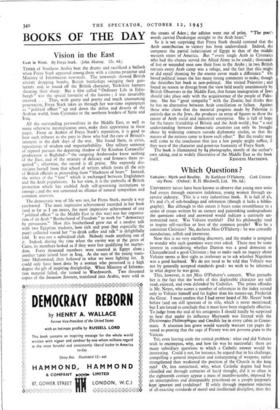BOOKS OF THE DAY
Vision in the East
TRIBES of Southern Arabia beat the drums and sacrificed a bullock when Freya Stark appeared among them with a cinema projector and
Ministry of Information newsreels. The newsreels showed British aircraft dropping bombs, British battleships swinging their gun- turrets and, to round off the British character, Yorkshire farmers shearing their sheep. But a film called " Ordinary Life in Edin- burgh " was the special favourite of the harems ; it was invariably encored. . . . Thus, with gaiety and poetry and much unassuming penetration, Freya Stark takes us through her war-time experiences as " political officer " up and down the deltas and deserts of the Arabian world, from Cyrenaica to the northern borders of Syria and Iraq.
All the outstanding personalities in the Middle East, as well as many otherwise inconspicuous ones, make their appearance in these pages. From an Arabist of Freya Stark's reputation, it is good to hear such tributes as she pays to those who had the care of Britain's interests in the dark days of the war. She found them, in crisis, repositories of wisdom and imperturbability- One solitary sentence of reproof pursues the departing shadow of Sir Kinahan Cornwallis' predecessor at Baghdad—" the outgoing Ambassador knew nothing of the East, and of the mixture of delicacy and firmness there re- quired" ; otherwise, the record is all praise. She expressly dis- sociates herself from that school of writers which treats all the acts of British officials as proceeding from " blackness of heart." Instead, she writes of the " love " which is exchanged between Englishmen and the Arab populations. In her view, it is the umbrella of British protection which has enabled Arab self-governing institutions to emerge ; and the war cemented an alliance of natural sympathies and common interests.
The democratic way of life was not, for Freya Stark, merely a war catchword. The most impressive achievement recorded in her book (and as far as I am aware, the most impressive achievement of any " political officer " in the Middle East in this war) was her organisa- tion of an Arab " Brotherhood of Freedom " to work for " democracy by persuasion." How this brotherhood grew out of a modest talk with two Egyptian students, how rich and poor (but especially the poor) collected round her " to drink coffee and talk " is delightfully told. It was not a subsidised club. Nobody made anything out of it. Indeed, during the time when the enemy was at the gates of Cairo, its members looked as if they were fast qualifying for martyr- dom. Forty thousand members were counted in Egypt alone ; another 7,000 joined later in Iraq. As she says of the young trans- lator Muhammad, they believed in what we were fighting for. It could only have been done by a woman who possessed in a high degree the gift of inspiring discipleship. When Ministry of Informa- tion material failed, she turned to Wordsworth. Two thousand copies of the Invasion Sonnets, translated into Arabic, were sold in the streets of Aden ; the edition went out of print. "The poet's words carried Dunkerque straight to the Arab heart."
So it is not surprising that Freya Stark should contend that the Arab contribution to victory has been undervalued. Indeed, she compares the partial isolationism of Egypt to that of the middle western states of America. But " every single Arab in Cyrenaica who had the chance served the Allied Army as he could ; thousands of lost or wounded men owe their lives to the Arabs ; in two British retreats every Arab camp was a refuge, and the fact that this might or did entail shooting by the enemy never made a difference." On broad political issues she has many strong comments to make, though she describes her book as non-political. She visited Palestine ; and found no reason to diverge from the view held nearly unanimously by British Observers in the Middle East, that future immigration of Jews should take place only with the acquiescence of the people of Pales- tine. She has " great sympathy " with the Zionist, but thinks that he has no alternative between Arab conciliation or failure. Against those who claim that the material progress made by Palestine is entirely due to the Jews, she produces an array of figures to show the extent of Arab social and industrial enterprise. She is full of hope for the future friendship of Britain and the Arab world ; but " a real understanding between democratic countries can only be brought about by widening contacts outside diplomatic circles, so that the masses of the nations come to know each other." But the reader may well come to the conclusion that just a few people might suffice, if they were of the character and generous humanity of Freya Stark.
The book is illuminated by 84 photographs, mostly of the author's own taking, and as widely illustrative of the Middle East as the book


























 Previous page
Previous page